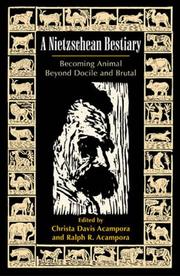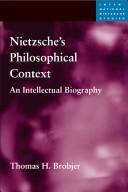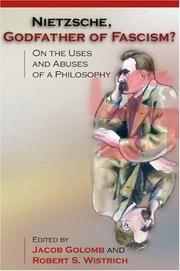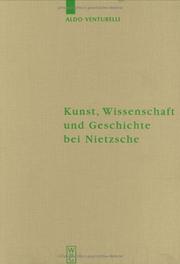| Listing 1 - 10 of 21 | << page >> |
Sort by
|
Book
ISBN: 9783110246568 9783110246575 3110246562 3112190157 3110481766 9786613399779 3110246570 1283399776 9781283399777 9783110481761 Year: 2011 Volume: 1 Publisher: Berlin ; Boston : De Gruyter,
Abstract | Keywords | Export | Availability | Bookmark
 Loading...
Loading...Choose an application
- Reference Manager
- EndNote
- RefWorks (Direct export to RefWorks)
The volume offers various considerations of Nietzsche's attempt to connect language to the instinctive activity of the human body. In focusing on how Nietzsche tries to dissolve the traditional opposition between instinct and language, as well as between instinct and consciousness and instinct and reason, the different papers address a great variety of topics, e.g. morality, value, the concept of philosophy, dogmatism, naturalization, metaphor, affectivity and emotion, health and sickness, tragedy, and laughter. Among the authors: Scarlett Marton, Werner Stegmaier, Patrick Wotling, and many ot
Nietzsche, Friedrich W. --- Instinct (Philosophy) --- Language and languages --- Philosophy --- Nietzsche, Friedrich Wilhelm, --- Instinct (Philosophy). --- Instinct (Philosophy) -- Congresses. --- Language and languages - Philosophy. --- Language and languages -- Philosophy -- Congresses. --- Nietzsche, Friedrich Wilhelm. --- Nietzsche, Friedrich Wilhelm, 1844-1900 -- Congresses. --- Philosophy & Religion --- Nietzsche, Friedrich --- Ni-tsʻai, --- Niče, Fridrih Wilhelm, --- Nīche, --- Nietzsche, --- Nietzsche, Bedřich, --- Nietzsche, Federico, --- Nietzsche, Frédéric, --- Nietzsche, Friederich, --- Nietzsche, Fryderyk, --- Niichʻe, --- Nitche, Fridrikh, --- Nīṭjhśe, --- Nitse, --- Nîtşe, Frîdrîk, --- Nīṭṣē, K̲apreṭarik Villiyam, --- Nitse, Phreiderikos, --- Nītshah, Frīdrish, --- Nit︠s︡he, F., --- Niṭshe, Fr. --- Niṭshe, Friedrikh, --- Niṭsheh, --- Nītshih, Firīdrīk, --- Nit︠s︡she, Fridrikh, --- Nitt︠s︡she, Fridrikh, --- Νιτσε, Φρειδερικος, --- Ницше, Фридрих, --- ניעטצשע, פריעדריך --- ניעטצשע, פרידריך וילהלם, --- ניצי׳שה, פרידריך --- ניטשע, פריעדריך --- ניטשע פריעדריך, --- ניטשע, פרידריך --- ניטשע, פרידריך, --- ניטשה --- ניטשה, פרידריך --- ניטשה, פרידריך, --- ניטשה, פרידריך וילהלם --- ניטשה, פרידריך וילהלם, --- نيتشه، فريدريك،, --- 尼采, --- 尼采弗里德里希, --- Nietzsche, Friederich --- Affectivity. --- Instinct. --- Language. --- Nietzsche, Friedrich. --- Rationality.

ISBN: 9780415315913 0415315913 9780415315906 0415315905 9780203964859 0203964853 9781134375400 9781134375448 9781134375455 Year: 2007 Volume: *8 Publisher: London: Routledge,
Abstract | Keywords | Export | Availability | Bookmark
 Loading...
Loading...Choose an application
- Reference Manager
- EndNote
- RefWorks (Direct export to RefWorks)
Aesthetics --- Nietzsche, Friedrich W. --- Art --- Aesthetics, Modern --- Philosophy. --- Nietzsche, Friedrich Wilhelm, --- Beautiful, The --- Beauty --- Art and philosophy --- Analysis, interpretation, appreciation --- History --- Ni-tsʻai, --- Niče, Fridrih Wilhelm, --- Nīche, --- Nietzsche, --- Nietzsche, Bedřich, --- Nietzsche, Federico, --- Nietzsche, Frédéric, --- Nietzsche, Friederich, --- Nietzsche, Fryderyk, --- Niichʻe, --- Nitche, Fridrikh, --- Nīṭjhśe, --- Nitse, --- Nîtşe, Frîdrîk, --- Nīṭṣē, K̲apreṭarik Villiyam, --- Nitse, Phreiderikos, --- Nītshah, Frīdrish, --- Nit︠s︡he, F., --- Niṭshe, Fr. --- Niṭshe, Friedrikh, --- Niṭsheh, --- Nītshih, Firīdrīk, --- Nit︠s︡she, Fridrikh, --- Nitt︠s︡she, Fridrikh, --- Νιτσε, Φρειδερικος, --- Ницше, Фридрих, --- ניעטצשע, פריעדריך --- ניעטצשע, פרידריך וילהלם, --- ניצי׳שה, פרידריך --- ניטשע, פריעדריך --- ניטשע פריעדריך, --- ניטשע, פרידריך --- ניטשע, פרידריך, --- ניטשה --- ניטשה, פרידריך --- ניטשה, פרידריך, --- ניטשה, פרידריך וילהלם --- ניטשה, פרידריך וילהלם, --- نيتشه، فريدريك،, --- 尼采, --- 尼采弗里德里希, --- Nietzsche, Friedrich --- Nietzsche, Friederich --- Philosophy --- Nietzsche, Friedrich Wilhelm --- Art - Philosophy. --- Aesthetics, Modern - 19th century. --- Nietzsche, Friedrich Wilhelm, - 1844-1900.

ISBN: 0520921607 058531828X 9780520921603 9780585318288 0520215532 9780520215535 Year: 1999 Publisher: Berkeley Los Angeles London University of California Press
Abstract | Keywords | Export | Availability | Bookmark
 Loading...
Loading...Choose an application
- Reference Manager
- EndNote
- RefWorks (Direct export to RefWorks)
Nietzsche: Naturalism and Interpretation offers a resolution of one of the most vexing problems in Nietzsche scholarship. As perhaps the most significant predecessor of more recent attempts to formulate a postmetaphysical epistemology and ontology, Nietzsche is considered by many critics to share this problem with his successors: How can an antifoundationalist philosophy avoid vicious relativism and legitimate its claim to provide a platform for the critique of arguments, practices, and institutions? Christoph Cox argues that Nietzsche successfully navigates between relativism and dogmatism, accepting the naturalistic critique of metaphysics and theology provided by modern science, yet maintaining that a thoroughgoing naturalism must move beyond scientific reductionism. It must accept a central feature of aesthetic understanding: acknowledgment of the primacy and irreducibility of interpretation. This view of Nietzsche's doctrines of perspectivism, becoming, and will to power as products of an overall naturalism balanced by a reciprocal commitment to interpretationism will spur new discussions of epistemology and ontology in contemporary thought.
Knowledge, Theory of. --- Ontology. --- Knowledge, Theory of --- Ontology --- Philosophy --- Philosophy & Religion --- Nietzsche, Friedrich Wilhelm, --- Contributions in theory of knowledge. --- Contributions in ontology. --- Epistemology --- Theory of knowledge --- Being --- Ni-tsʻai, --- Niče, Fridrih Wilhelm, --- Nīche, --- Nietzsche, --- Nietzsche, Bedřich, --- Nietzsche, Federico, --- Nietzsche, Frédéric, --- Nietzsche, Friederich, --- Nietzsche, Fryderyk, --- Niichʻe, --- Nitche, Fridrikh, --- Nīṭjhśe, --- Nitse, --- Nîtşe, Frîdrîk, --- Nīṭṣē, K̲apreṭarik Villiyam, --- Nitse, Phreiderikos, --- Nītshah, Frīdrish, --- Nit︠s︡he, F., --- Niṭshe, Fr. --- Niṭshe, Friedrikh, --- Niṭsheh, --- Nītshih, Firīdrīk, --- Nit︠s︡she, Fridrikh, --- Nitt︠s︡she, Fridrikh, --- Νιτσε, Φρειδερικος, --- Ницше, Фридрих, --- ניעטצשע, פריעדריך --- ניעטצשע, פרידריך וילהלם, --- ניצי׳שה, פרידריך --- ניטשע, פריעדריך --- ניטשע פריעדריך, --- ניטשע, פרידריך --- ניטשע, פרידריך, --- ניטשה --- ניטשה, פרידריך --- ניטשה, פרידריך, --- ניטשה, פרידריך וילהלם --- ניטשה, פרידריך וילהלם, --- نيتشه، فريدريك،, --- 尼采, --- 尼采弗里德里希, --- Nietzsche, Friedrich --- Nietzsche, Friederich --- Psychology --- Metaphysics --- Necessity (Philosophy) --- Substance (Philosophy) --- Nietzsche, Friedrich Wilhelm --- Contributions in theory of knowledge --- Knowledge [Theory of ] --- Contributions in ontology

ISBN: 0742514277 0742514269 146166523X 9781461665236 1299781764 9781299781764 9780742514263 9780742514270 9780742514270 Year: 2004 Publisher: Lanham, Maryland ; Oxford, England : Rowman & Littlefield Publishers, Inc.,
Abstract | Keywords | Export | Availability | Bookmark
 Loading...
Loading...Choose an application
- Reference Manager
- EndNote
- RefWorks (Direct export to RefWorks)
Nietzsche's use of metaphor has been widely noted but rarely focused to explore specific images in great detail. A Nietzschean Bestiary gathers essays devoted to the most notorious and celebrated beasts in Nietzsche's work. The essays illustrate Nietzsche's ample use of animal imagery, and link it to the dual philosophical purposes of recovering and revivifying human animality, which plays a significant role in his call for de-deifying nature.
Animals (Philosophy) --- Animaux (Philosophie) --- Dieren (Filosofie) --- Metafoor --- Metaphor --- Métaphore --- Parabole --- Metaphor. --- Animals (Philosophy). --- Nietzsche, Friedrich Wilhelm, --- Ni-tsʻai, --- Niče, Fridrih Wilhelm, --- Nīche, --- Nietzsche, --- Nietzsche, Bedřich, --- Nietzsche, Federico, --- Nietzsche, Frédéric, --- Nietzsche, Friederich, --- Nietzsche, Fryderyk, --- Niichʻe, --- Nitche, Fridrikh, --- Nīṭjhśe, --- Nitse, --- Nîtşe, Frîdrîk, --- Nīṭṣē, K̲apreṭarik Villiyam, --- Nitse, Phreiderikos, --- Nītshah, Frīdrish, --- Nit︠s︡he, F., --- Niṭshe, Fr. --- Niṭshe, Friedrikh, --- Niṭsheh, --- Nītshih, Firīdrīk, --- Nit︠s︡she, Fridrikh, --- Nitt︠s︡she, Fridrikh, --- Νιτσε, Φρειδερικος, --- Ницше, Фридрих, --- ניעטצשע, פריעדריך --- ניעטצשע, פרידריך וילהלם, --- ניצי׳שה, פרידריך --- ניטשע, פריעדריך --- ניטשע פריעדריך, --- ניטשע, פרידריך --- ניטשע, פרידריך, --- ניטשה --- ניטשה, פרידריך --- ניטשה, פרידריך, --- ניטשה, פרידריך וילהלם --- ניטשה, פרידריך וילהלם, --- نيتشه، فريدريك،, --- 尼采, --- 尼采弗里德里希, --- Nietzsche, Friedrich --- Nietzsche, Friederich --- Figures of speech --- Reification --- Philosophy --- Nietzsche, Friedrich Wilhelm
Book
ISBN: 0567031519 9780567031518 0567031527 9780567031525 Year: 2008 Publisher: London: T&T Clark International,
Abstract | Keywords | Export | Availability | Bookmark
 Loading...
Loading...Choose an application
- Reference Manager
- EndNote
- RefWorks (Direct export to RefWorks)
Philosophical theology. --- Nietzsche, Friedrich Wilhelm, --- Religion. --- 1 NIETZSCHE, FRIEDRICH --- Theology, Philosophical --- Philosophy and religion --- Theology, Doctrinal --- Filosofie. Psychologie--NIETZSCHE, FRIEDRICH --- Nietzsche, Friedrich Wilhelm --- Ni-tsʻai, --- Niče, Fridrih Wilhelm, --- Nīche, --- Nietzsche, --- Nietzsche, Bedřich, --- Nietzsche, Federico, --- Nietzsche, Frédéric, --- Nietzsche, Friederich, --- Nietzsche, Fryderyk, --- Niichʻe, --- Nitche, Fridrikh, --- Nīṭjhśe, --- Nitse, --- Nîtşe, Frîdrîk, --- Nīṭṣē, K̲apreṭarik Villiyam, --- Nitse, Phreiderikos, --- Nītshah, Frīdrish, --- Nit︠s︡he, F., --- Niṭshe, Fr. --- Niṭshe, Friedrikh, --- Niṭsheh, --- Nītshih, Firīdrīk, --- Nit︠s︡she, Fridrikh, --- Nitt︠s︡she, Fridrikh, --- Νιτσε, Φρειδερικος, --- Ницше, Фридрих, --- ניעטצשע, פריעדריך --- ניעטצשע, פרידריך וילהלם, --- ניצי׳שה, פרידריך --- ניטשע, פריעדריך --- ניטשע פריעדריך, --- ניטשע, פרידריך --- ניטשע, פרידריך, --- ניטשה --- ניטשה, פרידריך --- ניטשה, פרידריך, --- ניטשה, פרידריך וילהלם --- ניטשה, פרידריך וילהלם, --- نيتشه، فريدريك،, --- 尼采, --- 尼采弗里德里希, --- 1 NIETZSCHE, FRIEDRICH Filosofie. Psychologie--NIETZSCHE, FRIEDRICH --- Nietzsche, Friedrich --- Nietzsche, Friederich --- Philosophical theology --- Nietzsche, Friedrich Wilhelm, - 1844-1900. --- Nietzsche, Friedrich Wilhelm, - 1844-1900 - Religion. --- Nietzsche, Friedrich Wilhelm, - 1844-1900

ISBN: 0252032454 9780252032455 9780252090622 0252090624 1283135582 9786613135582 9781283135580 6613135585 Year: 2008 Publisher: Urbana : University of Illinois Press,
Abstract | Keywords | Export | Availability | Bookmark
 Loading...
Loading...Choose an application
- Reference Manager
- EndNote
- RefWorks (Direct export to RefWorks)
PHILOSOPHY --- History & Surveys / Modern --- Philosophers --- Philosophy & Religion --- Philosophy --- Nietzsche, Friedrich Wilhelm, --- Ni-tsʻai, --- Niče, Fridrih Wilhelm, --- Nīche, --- Nietzsche, --- Nietzsche, Bedřich, --- Nietzsche, Federico, --- Nietzsche, Frédéric, --- Nietzsche, Friederich, --- Nietzsche, Fryderyk, --- Niichʻe, --- Nitche, Fridrikh, --- Nīṭjhśe, --- Nitse, --- Nîtşe, Frîdrîk, --- Nīṭṣē, K̲apreṭarik Villiyam, --- Nitse, Phreiderikos, --- Nītshah, Frīdrish, --- Nit︠s︡he, F., --- Niṭshe, Fr. --- Niṭshe, Friedrikh, --- Niṭsheh, --- Nītshih, Firīdrīk, --- Nit︠s︡she, Fridrikh, --- Nitt︠s︡she, Fridrikh, --- Νιτσε, Φρειδερικος, --- Ницше, Фридрих, --- ניעטצשע, פריעדריך --- ניעטצשע, פרידריך וילהלם, --- ניצי׳שה, פרידריך --- ניטשע, פריעדריך --- ניטשע פריעדריך, --- ניטשע, פרידריך --- ניטשע, פרידריך, --- ניטשה --- ניטשה, פרידריך --- ניטשה, פרידריך, --- ניטשה, פרידריך וילהלם --- ניטשה, פרידריך וילהלם, --- نيتشه، فريدريك،, --- 尼采, --- 尼采弗里德里希, --- Nietzsche, Friedrich --- Nietzsche, Friederich

ISBN: 0691007101 0691007098 9786612087660 1282087665 1400825334 9781400825332 9780691007106 9781282087668 Year: 2002 Publisher: Princeton, NJ : Princeton University Press,
Abstract | Keywords | Export | Availability | Bookmark
 Loading...
Loading...Choose an application
- Reference Manager
- EndNote
- RefWorks (Direct export to RefWorks)
Nietzsche, the Godfather of Fascism? What can Nietzsche have in common with this murderous ideology? Frequently described as the "radical aristocrat" of the spirit, Nietzsche abhorred mass culture and strove to cultivate an Übermensch endowed with exceptional mental qualities. What can such a thinker have in common with the fascistic manipulation of the masses for chauvinistic goals that crushed the autonomy of the individual? The question that lies at the heart of this collection is how Nietzsche came to acquire the deadly "honor" of being considered the philosopher of the Third Reich and whether such claims had any justification. Does it make any sense to hold him in some way responsible for the horrors of Auschwitz? The editors present a range of views that attempt to do justice to the ambiguity and richness of Nietzsche's thought. First-rate contributions by a variety of distinguished philosophers and historians explore in depth Nietzsche's attitudes toward Jews, Judaism, Christianity, anti-Semitism, and National Socialism. They interrogate Nietzsche's writings for fascist and anti-Semitic proclivities and consider how they were read by fascists who claimed Nietzsche as their intellectual godfather. There is much that is disturbingly antiegalitarian and antidemocratic in Nietzsche, and his writings on Jews are open to differing interpretations. Yet his emphasis on individualism and contempt for German nationalism and anti-Semitism put him at stark odds with Nazi ideology. The Nietzsche that emerges here is a tragic prophet of the spiritual vacuum that produced the twentieth century's totalitarian movements, the thinker who best diagnosed the pathologies of fin-de-siècle European culture. Nietzsche dared to look into the abyss of modern nihilism. This book tells us what he found. The contributors are Menahem Brinker, Daniel W. Conway, Stanley Corngold, Kurt Rudolf Fischer, Jacob Golomb, Robert C. Holub, Berel Lang, Wolfgang Müller-Lauter, Alexander Nehamas, David Ohana, Roderick Stackelberg, Mario Sznajder, Geoffrey Waite, Robert S. Wistrich, and Yirmiyahu Yovel.
Fascism. --- National socialism and philosophy. --- Nietzsche, Friedrich Wilhelm, --- Neo-fascism --- Philosophy and national socialism --- Ni-tsʻai, --- Niče, Fridrih Wilhelm, --- Nīche, --- Nietzsche, --- Nietzsche, Bedřich, --- Nietzsche, Federico, --- Nietzsche, Frédéric, --- Nietzsche, Friederich, --- Nietzsche, Fryderyk, --- Niichʻe, --- Nitche, Fridrikh, --- Nīṭjhśe, --- Nitse, --- Nîtşe, Frîdrîk, --- Nīṭṣē, K̲apreṭarik Villiyam, --- Nitse, Phreiderikos, --- Nītshah, Frīdrish, --- Nit︠s︡he, F., --- Niṭshe, Fr. --- Niṭshe, Friedrikh, --- Niṭsheh, --- Nītshih, Firīdrīk, --- Nit︠s︡she, Fridrikh, --- Nitt︠s︡she, Fridrikh, --- Νιτσε, Φρειδερικος, --- Ницше, Фридрих, --- ניעטצשע, פריעדריך --- ניעטצשע, פרידריך וילהלם, --- ניצי׳שה, פרידריך --- ניטשע, פריעדריך --- ניטשע פריעדריך, --- ניטשע, פרידריך --- ניטשע, פרידריך, --- ניטשה --- ניטשה, פרידריך --- ניטשה, פרידריך, --- ניטשה, פרידריך וילהלם --- ניטשה, פרידריך וילהלם, --- نيتشه، فريدريك،, --- 尼采, --- 尼采弗里德里希, --- Nietzsche, Friedrich --- Nietzsche, Friederich --- Authoritarianism --- Collectivism --- Corporate state --- National socialism --- Synarchism --- Totalitarianism --- Philosophy --- Fascism --- National socialism and philosophy --- Nietzsche, Friedrich Wilhelm
Book
ISBN: 1137592990 1137601523 Year: 2017 Publisher: New York : Palgrave Macmillan US : Imprint: Palgrave Macmillan,
Abstract | Keywords | Export | Availability | Bookmark
 Loading...
Loading...Choose an application
- Reference Manager
- EndNote
- RefWorks (Direct export to RefWorks)
This book presents a reading of Nietzsche as a thinker of the suffered social histories of subjectivity. It suggests that Nietzsche’s concept of genealogy needs the concept of convalescence to be coherent. Genealogy is a form of reflection that traces the suffered scenes of which that reflection is symptomatic, whereas convalescence is the ordeal of reflection’s coming to bear its limits within scenes of embodied suffering. This theme is developed by appeals to Freud’s notion of mourning and the object relations theories of Melanie Klein and D.W. Winnicott, which insist on the primacy of suffered relationality in the genesis of subjectivity. Moreover, Adorno’s notion of negative dialectics and its emphasis on the primacy of the object are suggested as an alternative context within which to read Nietzsche’s writing, in contrast with dominant modes of criticism. The discussion will appeal to anyone interested in Nietzsche, critical theory and the relationship between psychoanalysis and philosophy.
Psychology. --- Social sciences. --- Psychology, general. --- Social Sciences, general. --- Psychoanalysis and philosophy. --- Nietzsche, Friedrich Wilhelm, --- Philosophy and psychoanalysis --- Ni-tsʻai, --- Niče, Fridrih Wilhelm, --- Nīche, --- Nietzsche, --- Nietzsche, Bedřich, --- Nietzsche, Federico, --- Nietzsche, Frédéric, --- Nietzsche, Friederich, --- Nietzsche, Fryderyk, --- Niichʻe, --- Nitche, Fridrikh, --- Nīṭjhśe, --- Nitse, --- Nîtşe, Frîdrîk, --- Nīṭṣē, K̲apreṭarik Villiyam, --- Nitse, Phreiderikos, --- Nītshah, Frīdrish, --- Nit︠s︡he, F., --- Niṭshe, Fr. --- Niṭshe, Friedrikh, --- Niṭsheh, --- Nītshih, Firīdrīk, --- Nit︠s︡she, Fridrikh, --- Nitt︠s︡she, Fridrikh, --- Νιτσε, Φρειδερικος, --- Ницше, Фридрих, --- ניעטצשע, פריעדריך --- ניעטצשע, פרידריך וילהלם, --- ניצי׳שה, פרידריך --- ניטשע, פריעדריך --- ניטשע פריעדריך, --- ניטשע, פרידריך --- ניטשע, פרידריך, --- ניטשה --- ניטשה, פרידריך --- ניטשה, פרידריך, --- ניטשה, פרידריך וילהלם --- ניטשה, פרידריך וילהלם, --- نيتشه، فريدريك،, --- 尼采, --- 尼采弗里德里希, --- Nietzsche, Friedrich --- Nietzsche, Friederich --- Philosophy --- Philosophy (General). --- Behavioral sciences --- Human sciences --- Sciences, Social --- Social science --- Social studies --- Civilization --- Mental philosophy --- Mind --- Science, Mental --- Human biology --- Soul --- Mental health
Book
ISSN: 18621260 ISBN: 9781934078419 1934078417 1614518157 1934078433 9781934078433 9781614518150 Year: 2014 Volume: 66 Publisher: Boston : De Gruyter,
Abstract | Keywords | Export | Availability | Bookmark
 Loading...
Loading...Choose an application
- Reference Manager
- EndNote
- RefWorks (Direct export to RefWorks)
Nietzsche's work was heavily influenced by ancient Greek philosophy. Meyer shows how Nietzsche attempted to revive the Heraclitean-Protagorean position that is critically analyzed by both Plato and Aristotle in the Theaetetus and Metaphysics IV, and establishes Nietzsche as a naturalist who believes that there are objective facts.The book not only highlights the foundations of his thought, but also restores order to Nietzsche's work.
Philosophy, Comparative --- Philosophy, Ancient --- Nietzsche, Friedrich Wilhelm, --- Philosophy, Comparative. --- Philosophy, Ancient. --- History of philosophy --- Nietzsche, Friedrich --- Ancient philosophy --- Greek philosophy --- Philosophy, Greek --- Philosophy, Roman --- Roman philosophy --- Comparative philosophy --- Ni-tsʻai, --- Niče, Fridrih Wilhelm, --- Nīche, --- Nietzsche, --- Nietzsche, Bedřich, --- Nietzsche, Federico, --- Nietzsche, Frédéric, --- Nietzsche, Friederich, --- Nietzsche, Fryderyk, --- Niichʻe, --- Nitche, Fridrikh, --- Nīṭjhśe, --- Nitse, --- Nîtşe, Frîdrîk, --- Nīṭṣē, K̲apreṭarik Villiyam, --- Nitse, Phreiderikos, --- Nītshah, Frīdrish, --- Nit︠s︡he, F., --- Niṭshe, Fr. --- Niṭshe, Friedrikh, --- Niṭsheh, --- Nītshih, Firīdrīk, --- Nit︠s︡she, Fridrikh, --- Nitt︠s︡she, Fridrikh, --- Νιτσε, Φρειδερικος, --- Ницше, Фридрих, --- ניעטצשע, פריעדריך --- ניעטצשע, פרידריך וילהלם, --- ניצי׳שה, פרידריך --- ניטשע, פריעדריך --- ניטשע פריעדריך, --- ניטשע, פרידריך --- ניטשע, פרידריך, --- ניטשה --- ניטשה, פרידריך --- ניטשה, פרידריך, --- ניטשה, פרידריך וילהלם --- ניטשה, פרידריך וילהלם, --- نيتشه، فريدريك،, --- 尼采, --- 尼采弗里德里希, --- Nietzsche, Friederich --- Nietzsche, Friedrich Wilhelm, - 1844-1900

ISBN: 3110177579 9786612196409 1282196405 3110204851 Year: 2003 Publisher: Berlin De Gruyter
Abstract | Keywords | Export | Availability | Bookmark
 Loading...
Loading...Choose an application
- Reference Manager
- EndNote
- RefWorks (Direct export to RefWorks)
Drawing on historical and critical text studies, the author analyzes decisive factors of the relationship between art and science in Nietzsche's work. The idea of a ""tragedy of knowing"" as the culmination of aesthetic tragedy becomes the leitmotif of the proposed interpretation. Venturelli thereby also illuminates aspects of Nietzsche's special place in modern philosophical discourse.
Nietzsche, Friedrich --- Philosophy, German --- Nietzsche, Friedrich Wilhelm, --- Criticism and interpretation. --- Ni-tsʻai, --- Niče, Fridrih Wilhelm, --- Nīche, --- Nietzsche, --- Nietzsche, Bedřich, --- Nietzsche, Federico, --- Nietzsche, Frédéric, --- Nietzsche, Friederich, --- Nietzsche, Fryderyk, --- Niichʻe, --- Nitche, Fridrikh, --- Nīṭjhśe, --- Nitse, --- Nîtşe, Frîdrîk, --- Nīṭṣē, K̲apreṭarik Villiyam, --- Nitse, Phreiderikos, --- Nītshah, Frīdrish, --- Nit︠s︡he, F., --- Niṭshe, Fr. --- Niṭshe, Friedrikh, --- Niṭsheh, --- Nītshih, Firīdrīk, --- Nit︠s︡she, Fridrikh, --- Nitt︠s︡she, Fridrikh, --- Νιτσε, Φρειδερικος, --- Ницше, Фридрих, --- ניעטצשע, פריעדריך --- ניעטצשע, פרידריך וילהלם, --- ניצי׳שה, פרידריך --- ניטשע, פריעדריך --- ניטשע פריעדריך, --- ניטשע, פרידריך --- ניטשע, פרידריך, --- ניטשה --- ניטשה, פרידריך --- ניטשה, פרידריך, --- ניטשה, פרידריך וילהלם --- ניטשה, פרידריך וילהלם, --- نيتشه، فريدريك،, --- 尼采, --- 尼采弗里德里希, --- Nietzsche, Friederich
| Listing 1 - 10 of 21 | << page >> |
Sort by
|

 Search
Search Feedback
Feedback About UniCat
About UniCat  Help
Help News
News